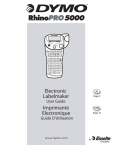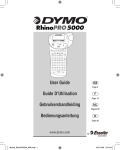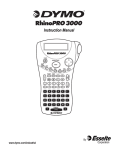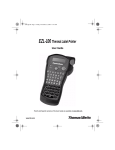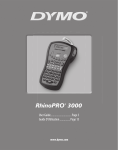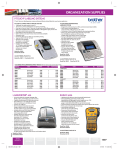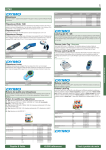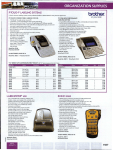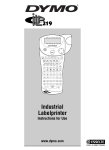Download Dymo Rhino Pro 5000 User guide
Transcript
User Guide www.dymo.com/industrial Tape Exit AC Power Connector LCD Display Cutter Lever Power Button Navigation Key Print Button Hot Keys Thumb Latch for Tape Compartment Backspace/Clear All Escape/Backlight Symbol Keys Function/Shift Function Keys Enter/OK Numeric Keys Alpha Keys Space Bar/ Symbol Key Thumb Latch for Battery Compartment Figure 1 RhinoPRO 5000 Printer 2 About Your New Printer With your new DYMO RhinoPRO™ 5000 printer, you can create a wide variety of high-quality, selfadhesive labels. You can choose to print your labels in many different sizes and styles. The printer uses RhinoPRO Industrial label cassettes in widths of 1/4” (6 mm), 3/8” (9 mm), 1/2” (12 mm), or 3/4” (19 mm). RhinoPRO label cassettes are also available in a wide range of materials. Visit www.dymo.com/industrial for information on obtaining tapes and accessories for your printer. Warranty Registration Please complete the warranty registration card and return it to the appropriate customer service address within seven days. Visit www.dymo.com/ industrial for details. Getting Started Follow the instructions in this section to get started by printing your first label. Power Supply Press thumb latch Figure 2 2. Insert the batteries following the polarity markings (+ and –). 3. Close the compartment door. Remove the batteries if the printer will not be used for a long period of time. Connecting the AC Adapter Connecting the AC adapter to the printer disconnects the batteries as a power source. To connect the AC adapter 1. Plug the power adapter into the power connector on the top, left side of the printer. The printer can operate on AC or battery power. To save power, the printer will automatically turn off after five minutes of inactivity. Inserting the Batteries The printer uses six AA batteries. To insert the batteries 1. Press the thumb latch on the bottom of the labelmaker to open the battery compartment door. See Figure 2. Figure 3 2. Plug the other end of the power adapter into a power outlet. Inserting the Tape Cassette Your printer comes with one label tape cassette. Visit www.dymo.com/industrial for information about purchasing additional label cassettes. 3 To insert the tape cassette 1. Press the thumb catch on the right side of the printer to open the tape cassette door. The first time you use the printer, remove the protective cardboard insert from between the print head and pinch roller. See Figure 4. Push down gently Print Head Pinch Roller Remove cardboard insert Figure 5 Tighten tape Selecting a Language = 6 mm = 9/12 mm = 19 mm Set cassette switch Figure 4 2. Set the cassette switch for the size of the tape cassette that you are inserting. See Figure 4. A notch in the cassette fits over the switch when the cassette is in the correct position. 3. Make sure the tape and ribbon are taut across the mouth of the cassette and that the tape passes between the guideposts. If necessary, turn the spool clockwise to tighten the ribbon. 4. Insert the cassette with the tape and ribbon positioned between the print head and pinch roller. See Figure 5. 4 5. Press firmly until cassette clicks into place. Make sure tape and ribbon are positioned correctly. 6. Close the tape cassette door and press to turn on the power. Several language-related features on the printer are determined by the language setting, such as availability of special characters, units of measure, menu text, and so on. By default the language is set to English. To select a language 1. Press + SIZE . 2. Use and to select the language. 3. Press to set the language. Select Universal as the language for the units of measure to be in millimeters. Printing Your First Label You are now ready to print your first label. To print a label 1. Enter text to create a simple label. 2. Press Print . 3. Cut the label using your thumb to lift the cutting lever and pull it towards the back of the printer. See Figure 6. SIZE: XL WRAP FIXED PPANEL TBLOCK BATTERY LINE CAPS BCODE VERT Figure 7 Backlighting When the printer is used in a low-light environment, the display may become difficult to read. The backlighting feature will light the display. ➤ Press + ESC to turn backlighting on and off. CAPS Mode Figure 6 4. Remove the label. Congratulations! You have printed your first label. Continue reading to learn more about the options available for creating labels. The CAPS key toggles capitalization on and off. When CAPS mode is turned on, the CAPS indicator is shown on the display and all letters that you enter will be capitalized. The default setting is CAPS mode on. When CAPS mode is off, all letters entered appear in lower case. Getting to Know Your Printer Function Key Become familiar with the location of the feature and function keys on your printer. See Figure 1 on page 2. The following sections describe each feature in detail. Power The button turns the power on and off. If no keys are pressed after five minutes, the power is switched off automatically. LCD Display The printer’s LCD display typically shows a row of fourteen characters. However, you can enter up to 99 characters and spaces. Hot key and feature indicators appear on the top, side, and bottom of the display to indicate that a feature is selected. See Figure 7. The key is used to select the function or symbol printed above a key. For example, when you press SIZE , the Font size menu appears in the display; however, if you press + SIZE together, the Language menu appears. Backspace Key The key removes the character to the left of the cursor. + clears all the current label text and fixed-length settings. Text size and other settings remain unchanged. Escape Key The ESC key returns you to the starting point from within any function. 5 Navigation Key Adding Symbols You can review and edit your label using the and arrows on the Navigation key. You can also view menu choices using and , and then press to make a selection. The printer supports the extended symbol set as shown in Figure 9. Designing Your Label You can choose from a number of formatting options to enhance the appearance of your labels. Changing the Font Size You can print the text on your label in five font sizes: extra-small, small, medium, large, and extralarge. Figure 8 shows the Font menu. XS S M L XL Figure 8 The font size you can use depends on the size of label tape that is installed in the printer. To set the font size 1. Press SIZE . 2. Use the arrow keys to select a font size. 3. Press . , ( ) ; ' " \ = ² ° & ? ∅ ∗ _ @ ± Figure 9 To add a symbol 1. Press + . The first row of symbols shown in Figure 9 is displayed. 2. Use the arrow keys to move to the desired symbol. Use and to move horizontally along a row of symbols. Use and to scroll vertically through the rows of symbols. 3. When you locate the desired symbol, press to add the symbol to your label. In addition, commonly used electrical and datacom symbols are available on individual keys for easy entry. See Figure 10. Creating Multi-Line Labels You can create multi-line labels depending upon the size of the label tape, as follows: Tape Size Number of Lines 1/4” 3/8” 1/2” 3/4” (6 mm) (9 mm) (12 mm) (19 mm) 1 2 2 4 To create a multi-line label 1. Type the text for the first line, and press . 2. Type the text for the next line. 3. Repeat these steps for each additional line. 6 Figure 10 Using International Characters The printer supports the extended Latin character set using RACE technology. Similar to using a mobile phone keypad, typing a letter multiple times within a very short time will scroll through variations of that letter. Once a label is saved to memory, you can recall the label to print or edit. To recall a label from memory 1. Press RECALL . The memory locations are displayed. 2. Use the arrow keys to move to the memory location that contains the label you want and press . Deleting a Label from Memory When you no longer need a stored label, you can delete it from memory. To delete a label from memory 1. Press RECALL . The memory locations are displayed. 2. Use the arrow keys to move to the memory location that contains the label you want. 3. Press + and then press to clear the memory location. FIXED PPANEL TBLOCK VERT Figure 11 Printing Wrap-Around Labels WRAP You can create labels that wrap around a cable or wire. The text is placed vertically or horizontally along the width of the cable and repeated so that you can read the label from any angle. You can select from a number of different wire gauges or cable lengths. Figure 12 for shows the menu selections available. CAT X/COAX 1/0-4/0 AWG 22-16 AWG CABLE 3.0” 14-10 AWG (Default) CABLE 4.0” 8-4 AWG CABLE 5.0” 3-1 AWG CABLE 6.0” Figure 12 To print vertical wire wraps 1. Enter the text for the label. 2. Press WRAP . 3. Use the arrow keys to move to the desired wire gauge or cable size, and press . 4. Press Print . 123 Recalling the Label from Memory BCODE WRAP 123 123 123 123 You can save up to eight labels in memory. To save a label 1. Type your label text. 2. Press SAVE to display the memory locations. Each memory location is represented by a box. Memory locations that contain a stored label are filled and when the cursor is positioned over a location, the contents are displayed. 3. Use the arrow keys to select an empty location. 4. Press to save the label. You can create labels for specific applications using hot keys. Hot keys are available for wraparound, fixed, patch panel, terminal block, and barcode labels. See Figure 11. 123 Saving your Label Using the Hot Keys 123 For example, if you repeatedly press the letter a, you will see a à á â ã ä å and so on through all the variations available. The order in which the character variations appear depends on the language you have selected to use. Figure 13 7 123 123 123 123 123 123 123 123 Figure 15 Normally, the length of the label is determined by the length of the text entered. However, you may wish to make a label for a specific purpose that is a fixed length regardless of the length of the text. You can specify a fixed length for a label in 0.250” (6 mm) increments between 0.500” (20 mm) and 40.000” (999.9 mm). The preset fixed length is 1.5” (25 mm). Any change you make to the fixed length setting remains in effect until you change it. The amount of text that will print on the label determines the minimum length of a label, regardless of the fixed length you set manually. For example, setting a fixed length of 0.50” for a label with 20 characters would have no effect on the label length. To set the label length 1. Press FIXED . 2. Press to increase the length. 3. Press to decrease the length. 4. Press . Printing Patch Panel Labels PPANEL Patch panel mode allows you to label a row of ports on a patch panel. You select the distance between ports, enter the desired text, serialize, and print. The result is a long label with multiple, evenly spaced text for each port. See Figure 15. Printing Terminal Block Labels TBLOCK Terminal block labels are very similar to patch panel labels; however, the text is printed vertically. See Figure 16. 03 04 FIXED To print a patch panel label 1. Enter the text for the first position on the label. 2. Press PPANEL . 3. Enter the distance between each label and press . The default is 0.5” (12 mm) and the value can be set in increments of 0.5” (12 mm) up to 20” (480 mm). 4. Follow the directions in Serializing Your Labels on page 9 to serialize the text that will print on the label. 02 Figure 14 Printing Fixed Length Labels 8 01 02 03 04 05 06 01 To print horizontal wire wraps 1. Enter the text for the label. 2. Press + WRAP . 3. Use the arrow keys to move to the desired wire gauge or cable size, and press . 4. Press Print . Figure 16 To print a terminal block label 1. Enter the text for the first position on the label. 2. Press TBLOCK . 3. Enter the distance between each label and press . The default is 0.5” (12 mm) and the value can be set in increments of 0.05” (1 mm) up to 20” (480 mm). 4. Follow the directions in Serializing Your Labels on page 9 to serialize the desired number or letter that will print on the label. Printing Vertical Labels VERT Single-line labels can be printed with the text running vertically. To print vertically 1. Enter the text for your label. 2. Press VERT and then Print . Printing Barcode Labels + VERT . The printer can generate two types of barcodes: CODE-39 and CODE-128. You can only print a barcode on 3/4” (19 mm) label tape. The barcode will print horizontally along the label with the text in small print underneath the barcode. You can optionally add text before and after the barcode. To create a barcode 1. Enter the text you wish to appear before the barcode on the label. (Optional) 2. Press + VERT . 3. Use the arrow keys to choose CODE-39 or CODE-128, and press . 4. Enter the text for the barcode between the barcode symbols ( ) and press . 5. Enter any text you wish to appear after the barcode. (Optional) 6. Press Print . Printing Options You can choose to print multiple copies of the same label, print serialized labels, or print a combination of both. Printing Multiple Copies You can print up to 99 copies of the same label at one time. When printing multiple copies, a dotted cut-line is printed between each label. To print multiple copies 1. Press + Print . 2. Press the arrow to increase the number of copies to print. The default is 2 copies. 3. Press the arrow to decrease the number of copies (maximum is 99). 4. Press or Print to begin printing. You may notice a brief pause in printing between each label for more complex formats. When printing is finished, the number of copies to print returns to 2. Advancing the Label Tape The default leader space for all labels is approximately 5/16” (10 mm). To add additional blank space to the beginning or end of your label, you can feed the tape in 0.25” (6 mm) increments. ➤ Press + RECALL . Serializing Your Labels You can print serialized labels numerically or alphabetically. Numbers can be incremented from 1-99 and letters from A-Z. You can serialize any number or letter by placing the cursor under the position to be incremented, such as the number 2 in 123 or the letter B in ABC. For example, with the cursor under the 2 in 123 and the increment #=3, the resulting labels would print as 123, 133, and 143. When the letter Z or the number 9 is reached during serialization, a letter or number is added to increase the increment. For example, Z increments to AA and 9 increments to 10. When a space is present in a string to be serialized, only the numbers or letters after the space are serialized. 9 To serialize your labels 1. Enter the text for your label. 2. Use the arrow keys to move the cursor under the letter or number to serialize. 3. Press SERIAL . 4. Enter the number of labels you wish to print and press or Print to begin printing. Enter 1-99 for numbers and 1-26 for letters. To print multiple copies of the same serialized label, choose + Print and enter the number of copies of each label to print. See Printing Multiple Copies on page 9. Adjusting Print Quality (Advanced) Depending on the label material you choose, you may need to lighten or darken the print on the label. Adjusting the print head temperature allows you to control the print quality (+/- 20). To set the print head temperature 1. Press + SAVE . 2. Use the arrow keys to select the print head temperature and press . 3. Repeat as necessary until you are satisfied with the print quality. 10 Cleaning Your Printer Your printer is designed to give you long and trouble-free service, while requiring very little maintenance. Clean your printer from time to time to keep it working properly. Clean the cutter blade each time you replace the tape cassette. To clean the cutter blade 1. Remove the tape cassette. 2. Press and hold down the cutter lever to expose the cutter blade. 3. Use a cotton ball and alcohol to clean both sides of the blade. 4. Release the cutter lever. To clean the print head ➤ Clean the print head using the cleaning tool located inside the tape compartment lid. RhinoPRO Label Cassettes The following industrial label cassettes are available for the RhinoPRO 5000 printer. Material Type 3/8” 1/2” 3/4” (9 mm) (12 mm) (19 mm) Length Flexible Nylon White — 18488 18489 11.5’ (3.5 m) Flexible Nylon Yellow — 18490 18491 11.5’ (3.5 m) Permanent Polyester White 18482 18483 18484 18.0’ (5.5 m) Permanent Polyester Metallic 18485 18486 18487 18.0’ (5.5 m) Troubleshooting Review the following possible solutions if you encounter a problem while using your printer. Problem/Error Message Solution No display • Ensure the printer is turned on. • Replace discharged batteries. Poor Print Quality • • • • Poor Cutter Performance Clean the cutter blade. See Cleaning Your Printer. !!!!!!!!!!!!! printer is jammed. Replace discharged batteries. Ensure tape cassette is installed properly. Clean the print head. Replace the tape cassette. Remove cassette to clear the tape jam. Replace the batteries. Batteries are discharged. Text Limit Exceeded maximum number of characters in buffer. Delete some or all of the buffer text. Too many lines Exceeded maximum number of lines allowed. Select another format. Enter numbers only Non-numeric characters entered in error. Enter only numeric characters for this selection. Print failed Undetermined printer error. Check for tape jam, empty tape cassette, discharged batteries, or other problems. No tape Tape cassette missing or empty. Insert a new tape cassette Battery low Batteries almost discharged. Replace batteries or connect AC power adapter. Tape Jam Motor is stalled due to tape jam. • Remove jammed tape and replace tape cassette. • Clean cutter blade. If you still need assistance, contact DYMO Customer Support for your country. The Warranty booklet includes a list of contact numbers for each country. Documentation Feedback We are constantly working to produce the highest quality documentation for our products. We welcome your feedback. Send us your comments or suggestions about our user guides. Please include the following information with your feedback: • Product name, version number, and page number • Brief description of content (instructions that are inaccurate or unclear, areas where more detail is needed, and so on) We also welcome your suggestions about additional topics you would like to see covered in the documentation. Send email messages to: [email protected] Please keep in mind that this email address is only for documentation feedback. If you have a technical question, please contact Customer Support. 11 This product is CE marked in accordance with the EMC directive and the low voltage directive and is designed to conform with the following international standards: US FCC Class B Compatibility Safety - EN 60950, IEC 950, UL 1950 EMC Compatibility EN 61000 3-2/3 ; EN 61000 4-2/3/4/5/6/8/11; ENV 50204; EU Immunity - EN 55024 & addendums A1, A2 Electromagnetic Compatibility (EMC) - Information Technology equipment, Immunity Characteristics Emissions – EN 61000-6-3: Electromagnetic Compatibility (EMC) - Part 6: Generic Standards - Section 3: Emission standard for residential, commercial and light industrial environments. Esselte is an ISO 14000 registered company. Plastic components of this printer have been marked to enable final disposal in a manner that is sensitive to the environment. DYMO Corporation 44 Commerce Road Stamford, CT 06902-4561 (203) 355-9000 © 2003 DYMO Corporation. All Rights Reserved. No part of this document may be reproduced or transmitted in any form or by any means or translated into another language without the prior written consent of DYMO Corporation. RhinoPRO is a trademark of DYMO Corporation. DYMO is a registered trademark of Esselte Corporation. All other trademarks are the property of their respective holders. 927448 Rev 11/03












